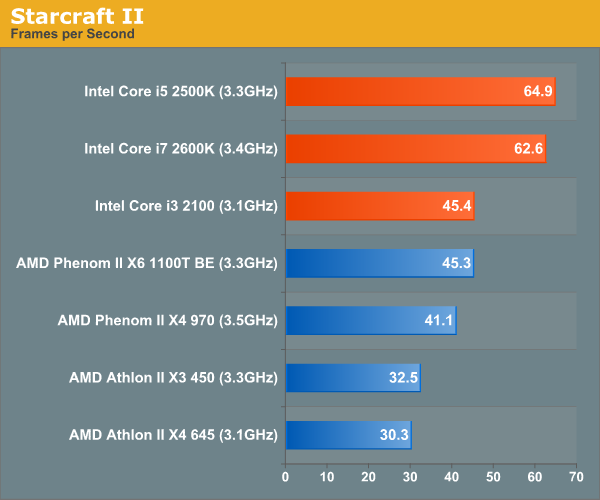|
Agreed posted:Yeah, but I'm wondering if that's just because they've got complex processes spread out in discrete threads with core affinity and then they sync it all up at the end, or if it's because the game is more deeply multi-threaded and could run just as well (thought experiment follows) on an 8-core system with half the clock per core, assuming clock for clock parity. In other words, multi-threaded, or quad-threaded? One thing people tend not to realize is a hypothetical single-core CPU A which has twice the single-threaded performance of a dual-core CPU B is superior in all kinds of workloads no matter how whether it's single-threaded or multithreaded. Single-thread performance is still very important today and in the future, since we are already seeing stuff like that simply doesn't scale well than more than 2/4 threads, plus the fact diminishing returns gets worse as you add more and more threads even for workloads that can be perfectly scaled to any threads.
|
|
|
|

|
| # ? May 10, 2024 19:57 |
|
freeforumuser posted:One thing people tend not to realize is a hypothetical single-core CPU A which has twice the single-threaded performance of a dual-core CPU B is superior in all kinds of workloads no matter how whether it's single-threaded or multithreaded. Isn't that the reason that the market moved towards dual cores in the first place? Single threaded technology had already begun to hit diminishing returns. Unless there's another way to expand upon current CPU technology we will hit a wall and have to redesign the way CPU's work from the ground up.
|
|
|
|
joe944 posted:Isn't that the reason that the market moved towards dual cores in the first place? Single threaded technology had already begun to hit diminishing returns. We hit a gigahertz wall, but that's not the end of per-core improvements. For example, some functions would take 2 or more cycles to complete on older processors, and now will finish in 1. However, the logic that can complete those instructions in fewer cycles are more complex and harder to design. This is where core-shrinkage really comes into play. They can do this by fitting more logic in a smaller area, since smaller transistors mean a signal will take less time to propagate. Digital logic has to balance the gate-depth and propagation time versus the operating speed. Electricity has to run the transistors, and with the speed the processor operates at this becomes a major factor in circuit complexity. So, per-core effectiveness is still increasing, even if parallel computing takes all the credit. If we hit a transistor size limit, however, parallelism will be the only thing left. My i3 has a far better per-core performance than my Q6600, and both came out well after we hit the ghz wall. zeekner fucked around with this message at 04:08 on Sep 27, 2011 |
|
|
|
Corvettefisher posted:yeah I kinda need the 16cores for my virtualization You'll hit disk throughput before you saturate a 16 core proc. Besides if you're legit you'd max level the relative weight settings in your hypervisor
|
|
|
|
incoherent posted:You'll hit disk throughput before you saturate a 16 core proc. Besides if you're legit you'd max level the relative weight settings in your hypervisor Yeah hence my Raid 5 and Raid 0+1 arrays, I think I will be fine on disk I/O 6 is good but I am running them about 80% right now
|
|
|
|
Corvettefisher posted:Yeah hence my Raid 5 and Raid 0+1 arrays, I think I will be fine on disk I/O 6 is good but I am running them about 80% right now You forgot to add
|
|
|
|
Anandtech is reporting that AMD is finally confirming that they are having 32nm yield issues and that these issues will cause them to miss revenue forecasts. I guess that confirms why we don't have Bulldozer yet, along with the Llano shortages we already knew about. Edit: Remember how we were supposed to get the Radeon HD 7800-series this month? Fudzilla is reporting that AMD has pushed the release back due to issues with the TSMC 28nm low-power process. There's still some hope of a Q4 2011 soft launch, but they don't expect product to be available in volume until 2012. One question is whether we'll see additional delays for the 7900-series, as those products were expected in Q1 2012, but are using an even more problematic process. TSMC Alereon fucked around with this message at 05:11 on Sep 29, 2011 |
|
|
|
Found a pretty legit BD leak from PCWorld France.quote:"In the more upscale, FX processors based on the Bulldozer architecture we also disappointed: while they are still generally more efficient than their predecessors and allow AMD to approach much of the last Core i5 and i7 but their performance remains below expectations. Besides, as we announced already in our previous issue, if they can sometimes compete with Sandy Bridge in the applications of rough calculations, the results are in video games very far behind. Only overclockers (and fanboys) will find them a great interest given their predisposition in this area."
|
|
|
|
Alereon posted:Anandtech is reporting that AMD is finally confirming that they are having 32nm yield issues and that these issues will cause them to miss revenue forecasts. I guess that confirms why we don't have Bulldozer yet. ugh- well there goes my plan of building a new machine in October  I hope AMD/Global Foundries can get their yields up, Intel's Ivy Bridge parts are supposed to be out as soon as March 2012.
|
|
|
|
My AMD stock is down 12% right now. Ugh.
|
|
|
|
Do any AMD motherboards support SSD caching? If not, will they in the future?
|
|
|
|
No and no clue when if ever. What leaked future release charts we have for AMD chipsets don't mention it for anything a year or 2 in the future FWIW. Seems like AMD has really fumbled BD as badly as I feared given that quote from the French site. drat shame. Not their fault TSMC is having problems too though. Seems like no one besides Intel has got their poo poo together for sub 45nm processes.
|
|
|
|
freeforumuser posted:Found a pretty legit BD leak from PCWorld France. Hmm, I wonder why the architecture is always so behind in games?
|
|
|
|
FormerFatty posted:Do any AMD motherboards support SSD caching? If not, will they in the future? Longinus00 posted:Hmm, I wonder why the architecture is always so behind in games? Alereon fucked around with this message at 23:04 on Sep 29, 2011 |
|
|
|
Alereon posted:Games have been AMD's weak area for awhile, it's due to their poor per-thread performance. How long do we let them slide on the "Intel are basically rat bastards" thing before we just come out and say that everything has been AMD's weak area for, what, five years now? You don't shrink from 25% to less than 5% of the server market despite extremely low priced hardware without some culpability. Their processors have been lagging in performance since Intel ditched the long pipeline and started building more around the Pentium M architecture. The good old days are going to be awfully hard to reclaim at this rate and I'm worried it's going to put Intel in a position of even more market dominance that'll be like a boot on AMD's throat, how can they get up? At least their graphics cards are legitimate great price to performance cards, and they swept the next gen consoles. That'll... help. But Bulldozer is looking like a total disappointment at this point, maybe even a flop if they can't get the price down (and how will they do that when their yields are so crap?) and I am pretty upset about it. Every single thing that could go wrong has, both from a bad luck but also from a decision making standpoint. Yeah, Intel still hosed them over pretty bad, it would be unfair to forget about that but god drat it. Agreed fucked around with this message at 23:53 on Sep 29, 2011 |
|
|
|
Longinus00 posted:Hmm, I wonder why the architecture is always so behind in games? It didn't had the massive IPC advantages Intel has since the first C2Ds; Intel chips simply perform well regardless of threads. Clock-for-clock Phenom II X4 is only just as fast a Q6600. When you pit a Phenom II X4 against a Intel CPU with a ~50% IPC advantage in a dual-threaded game it looks like this: 
|
|
|
|
Agreed posted:How long do we let them slide on the "Intel are basically rat bastards" thing before we just come out and say that everything has been AMD's weak area for, what, five years now? You don't shrink from 25% to less than 5% of the server market despite extremely low priced hardware without some culpability. Their processors have been lagging in performance since Intel ditched the long pipeline and started building more around the Pentium M architecture. The good old days are going to be awfully hard to reclaim at this rate and I'm worried it's going to put Intel in a position of even more market dominance that'll be like a boot on AMD's throat, how can they get up? The situation is almost entirely reversed in the low-power market, as Intel completely hosed themselves with Atom and won't begin to recover until 2013. AMD's low-power Fusion processors (E, C, Z-series) have a commanding lead and sell as fast as AMD can make them. Their Llano processors have pretty disappointing CPU performance, but putting a decent GPU on-die makes them pretty compelling for laptops where the costs (especially in terms of power) of a discrete GPU aren't worth it. Llano also delivers 4 cores in a space where Intel usually delivers 2, which doesn't always help but isn't as useless as having more than 4 cores typically is.
|
|
|
|
Alereon posted:I think that's a little pessimistic. Their desktop performance has been generally weak, but they delivered a hex-core processor far more cheaply than Intel did, and maintained performance leadership in the value segment up until Sandy Bridge. Their strategy has always been more cores/$ and more performance/$ and watt in servers (as well as memory quantity and bandwidth/$), which doesn't translate to a desktop strategy since desktop applications are still poorly threaded. Marketshare numbers don't exactly tell the whole story because AMD Opterons excel in 4+ socket configurations, while Intel leads in 1-2 sockets, so each server AMD wins sells more processors and those processors are worth more (as they're 12-core, 8-way models). AMD has had great success in the supercomputer market for this reason, for example. Basically AMD's server strategy is targeting huge servers for virtualization, while Intel concentrates on more performance-sensitive applications. It is pessimistic because Intel can annihilate AMD in every sector, if they choose to. Server: I'm don't track stuff here, but anything wrong with the Intel server platform was long fixed since Nehalem with the IMC, QPI and HT. Sandy bridge only made the same stuff even better. Desktops: Release an unlocked i3. No reason to even buy AMD anymore. Laptops: Cut SB prices against Llano. Actually Intel doesn't even need to do anything since dualcore SBs laptops with Llano-grade GPUs are already as competitive as it is, pricing-wise. (considering how slow is the Llano CPU) Netbooks: Release a single core SB. Zacate? What is that again?
|
|
|
|
AMD does still hold the x64 patent. That's a hell of a safety net. And Intel would get AT&T'd if they really tried to eliminate AMD as a competitor. But that's such a hosed up place for AMD to be - under the limited protection of a mutually assured destruction patent war, and the tenuous mercy of Intel because AMD is what protects them from being broken up as a monopoly. I just... It's crap, to know that they are and will be held at such a competitive disadvantage because Intel has more money than god and all the problems AMD has, Intel doesn't have. AMD attempts these innovations but they're stuck behind. They can't even get yields at their designed process and are having yield issues with ATI cards at the same time, meanwhile Intel is steadily progressing to smaller lithography and making basically all the right choices for power saving, etc. AMD seems to be on life support from their "competitor" for no other reason than one really good bargaining chip (x64 and cross-licensing agreements) and the need for there to be an ostensible competitor for Intel so regulatory bodies stay off their back (anti-trust settlements and extensions under duress of the aforementioned agreements). AMD are on a leash and it's choking the poo poo out of them. Extremely parallel supercomputers for less money with off the shelf parts are cool but they don't change the fact that confidence in the AMD brand is total crap, as expressed privately by review organizations and publicly by shareholders. Key people leaving... Find the silver lining, I don't see it. Agreed fucked around with this message at 03:00 on Sep 30, 2011 |
|
|
|
I think AMD/Intel have got a patent agreement that covers most of that stuff. The details of it are publicaly unknown AFAIK though.
|
|
|
|
freeforumuser posted:It is pessimistic because Intel can annihilate AMD in every sector, if they choose to. quote:Server: I'm don't track stuff here, but anything wrong with the Intel server platform was long fixed since Nehalem with the IMC, QPI and HT. Sandy bridge only made the same stuff even better. quote:Desktops: Release an unlocked i3. No reason to even buy AMD anymore. quote:Laptops: Cut SB prices against Llano. Actually Intel doesn't even need to do anything since dualcore SBs laptops with Llano-grade GPUs are already as competitive as it is, pricing-wise. (considering how slow is the Llano CPU)
|
|
|
|
freeforumuser posted:Netbooks: Release a single core SB. Zacate? What is that again? Considering Atoms are already dual core, it'd be silly to replace them with a single core sandy bridge. Noone wants to be stuck with single-core today.
|
|
|
|
I've always wondered why everyone always seems to root for AMD. Is it nostalgia for I know a lot of it is wanting the competition in the market, but I never saw much rooting for Intel back when AMD was on top.
|
|
|
|
KillHour posted:I've always wondered why everyone always seems to root for AMD. Is it nostalgia for AMD was never "on top". Having a better product than your competitor doesn't mean you're "on top".
|
|
|
|
trandorian posted:Considering Atoms are already dual core, it'd be silly to replace them with a single core sandy bridge. Noone wants to be stuck with single-core today. A single core SB is going to murder any Atom or Zacate CPUs regardless of cores, with much better performance/watt to boot. http://www.xbitlabs.com/articles/cpu/display/core-i3-2100t_11.html#sect0 But I think I'm derailing a BD thread so I'll just stop here. 
|
|
|
|
KillHour posted:I've always wondered why everyone always seems to root for AMD. Is it nostalgia for Also I guess we're all worried Intel will slump back to its old ways without AMD competing hard.
|
|
|
|
Longinus00 posted:AMD was never "on top". Having a better product than your competitor doesn't mean you're "on top". They weren't "on top" with regards to marketshare, but they were definitely "on top" in terms of performance during the Athlon 64 vs. Netburst days.
|
|
|
|
If I was king of AMD, I would start innovating in other areas - low power, mobile, embedded, etc. The only way to stave off the company eventually dying is to branch out into some new technology where they don't have to compete head-on with Intel. Of course that's much easier said than done, it would take mountains of capital to invest in R&D and I really doubt AMD could make that happen. Actually what it really takes is a loving excellent CEO and I don't think AMD has had one within the past decade or so.
|
|
|
|
SourKraut posted:They weren't "on top" with regards to marketshare, but they were definitely "on top" in terms of performance during the Athlon 64 vs. Netburst days. Which didn't amount to a whole lot in the grand scheme of things, since they didn't really have the brand recognition to command a high selling price or enough fabbing capacity to grab a large market share. I think they owned something like 22% of the consumer market while their cpu's were murdering the competition.
|
|
|
|
Even a little before that, a lot of people I knew where getting Athlon XP Bartons and clocking them up. Seemed a solid bet at the time, for the price.
|
|
|
|
nodm posted:Which didn't amount to a whole lot in the grand scheme of things, since they didn't really have the brand recognition to command a high selling price or enough fabbing capacity to grab a large market share. I think they owned something like 22% of the consumer market while their cpu's were murdering the competition. I wonder what their share is now? We're seeing a huge number of E-350 laptops (not just netbooks) - sure perhaps it's ill advised as far as long term reputation goes but at the low end of the market people very much buy on price and AMD is considerably undercutting even the low end Pentiums.
|
|
|
|
dissss posted:I wonder what their share is now? We're seeing a huge number of E-350 laptops (not just netbooks) - sure perhaps it's ill advised as far as long term reputation goes but at the low end of the market people very much buy on price and AMD is considerably undercutting even the low end Pentiums. 2011 Q3 AMD 10.4% vs Intel 81.8% by revenue Keep in mind that the E-350 isn't exactly the money-printing machine like Sandy Bridge.
|
|
|
|
They have zero alternatives. It's catch where catch can. Intel won't move to totally cut them off because Intel needs them to exist. I think the "in a world without regulations" (my interpretation of "where _____ could do whatever they want") is a little specious, no offense intended Alereon, because at any point after the glory days between Thunderbird and Hammer, Intel would actually have been able to kill AMD dead without regulation to worry about. Whereas at no point during the Thunderbird-->Hammer period could AMD have done the same. It was an impressive example of rising to the occasion and forcing competition from Intel, but that's exactly what it accomplished. Now, there is no day to seize. You said Intel makes a lot of bad decisions, but their processors are blazing and their marketshare is as close to complete as you can hope for without immediately being told to gently caress off as a monopoly. I get what you mean when you say AMD's cheap cheap cheap processors make them a good choice for highly parallel supercomputers, but 5% vs 95% of the server market really can't be interpreted as anything but "AMD has taken a massive beating," and I would add "in no small part because their chips stopped getting faster some time toward the end of 2007 until now." It's great that they'll finally have a chip that will compete with an i7!... It's just the wrong damned i7, they'll be two generations behind at launch, and the price category that they seem to be falling into doesn't promote their chances to reclaim lost marketshare anywhere that matters.
|
|
|
|
Where's Llano being slow coming from? I'm on an A6-3400m which as I understand is the exact midpoint of the series, and it's a 1.4ghz quadcore. Off just hearing the clockspeed, I wasn't expecting much, but the 2.2ghz turboboost does a pretty good job of keeping it from seeming slow and with a bit of tweaking with k10stat or fusiontweaker you can get the thing to constantly run at that rate or higher, which is something I was never expecting out of a laptop.
|
|
|
|
Hog Butcher posted:Where's Llano being slow coming from? I'm on an A6-3400m which as I understand is the exact midpoint of the series, and it's a 1.4ghz quadcore. If it's fast enough for you, then that is good enough. But if you compare it to other CPU's it's obvious how weak it is.  Most people aren't using a Llano to render video or do intense calculations, so for day to day use and gaming (where the built-in GPU gives a huge boost) it's fine.
|
|
|
|
quote:Meanwhile, AMD's server processor codenamed Interlagos will also have difficulty shipping on schedule and is expected to be delayed to November. Source: http://www.digitimes.com/news/a20110930PD207.html I'm speechless.
|
|
|
|
AMD copped to production issues with 32nm, not a good sign
|
|
|
|
nodm posted:Which didn't amount to a whole lot in the grand scheme of things, since they didn't really have the brand recognition to command a high selling price or enough fabbing capacity to grab a large market share. I think they owned something like 22% of the consumer market while their cpu's were murdering the competition. I dunno how accurate this chart is (it's based off benchmarks submitted to a benchmark site) but it seems to say AMD wasn't that low back in the day:  ( from http://www.cpubenchmark.net/market_share.html )
|
|
|
|
trandorian posted:I dunno how accurate this chart is (it's based off benchmarks submitted to a benchmark site) but it seems to say AMD wasn't that low back in the day: Being self-selected data, that mostly shows that AMD's market share nearly met Intel's in the enthusiast market that dominates such sites. AMD had a much bigger share when it was at its peak, but it still had a lot of resistance out of Intel brand loyalty and corporate customers that didn't trust moving to other vendors. And random people just bought whatever was on sale, at the time often meaning lots of crappy Celerons. Generally people who are reading and submitting data to hardware sites are going to be more aware of the best performing products than the general population.
|
|
|
|

|
| # ? May 10, 2024 19:57 |
|
According to Steam, AMD has a hair over 25% of the 'gamer' CPU market: http://store.steampowered.com/hwsurvey It also shows Firefox as being installed on 60% of computers, compared to Chrome's 11%. Interesting because I just read an article that claims Chrome is closing in on FireFox's marketshare http://www.businessinsider.com/google-chrome-market-share-2011-9
|
|
|



























